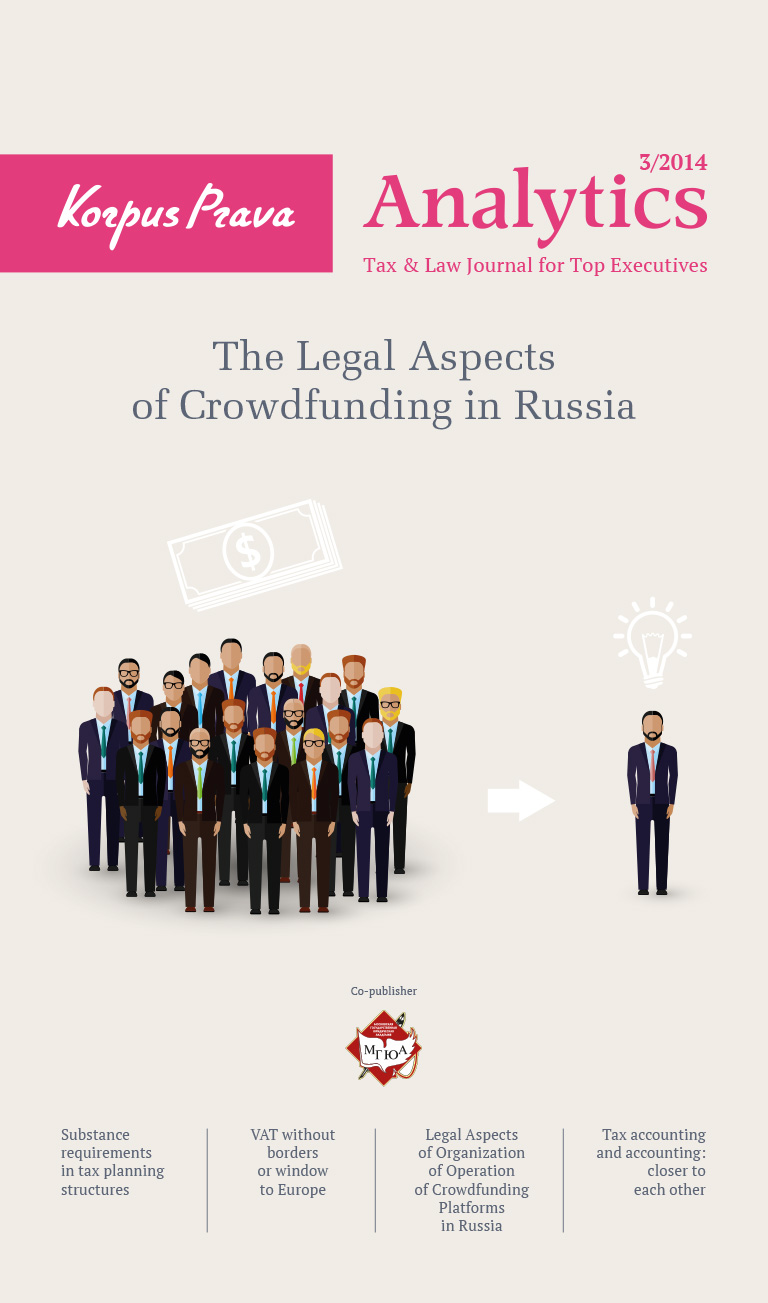- Cyprus Citizenship Scheme for Foreign Investors
- Squeezed But Pleased: Taxation of Passive Income in the European Union
- VAT Without Borders or Window to Europe
- Legal Aspects of Organization of Operation of Crowdfunding Platforms in Russia
- Substance Requirements in Tax Planning Structures
- “Deposit Splitting” of Individuals. Legal Civil and Criminal Aspects
Let’s See the Colour of Your Money!
Fast development of the Armed Forces of the Russian Federation in recent years would have been impossible without the systematic renewal of the existing outdated equipment, which, in turn, required multi-million state budget injections as part of the Armaments 2020 priority procurement program. The major aim of the Armaments 2020 priority procurement program is to bring the percent of advanced arms and military equipment in the Russian armed forces up to 70% by 2020. To that end, 20.7 trillion rubles are to be allocated, with 19 trillion rubles aimed at arming forces, air forces and naval forces. About 70% thereof will be spent on arms procurement, and the remaining 30% will be equally divided between research and development, and arms refurbishment. Three more trillion rubles are allocated for the technical upgrade of military-industrial complex enterprises.
Considering the amount of investments, these conditions justify the intention of the government to ensure maximum control over the spending procedure of budget funds. Taking into account the specific nature of arms and military equipment procurement, at the end of 2012, Federal Law No. 275-ФЗ dated 29.12.2012 On state defense order came into effect.
The cornerstone of the legal act under consideration is the prescribed procedure for account settlements among interacting participants of goods supplies under the state defense order in assisted transactions (cooperation). The cooperation includes the chief provider entering into the government contract with the government customer, providers entering into contracts with the chief provider, and providers entering into contracts with providers.
As envisioned by the legislator, participants of the abovementioned chain starting from the chief provider to the last provider should open a separate account, i.e. an account for the chief provider, provider at the authorized bank for account settlements regarding the state defense order under the terms of the government contract. In fact, a separate account is an ordinary settlement account at the bank; however, spending arrangements thereof have significant restrictions.
Thus, arrangements for using a separate account include:
- Debiting money only upon the government contract identification in the order.
- Debiting money only for a separate account, except for debiting money for other bank accounts in the following cases:
- Payment of taxes and duties, customs duties, insurance contributions and other obligatory budget payments of the Russian Federation, stipulated by the legislation of the Russian Federation;
- Payment of expenses on goods supplies, works performance, service provision as per prices (tariff rates) subject to government regulation (the list of such goods, works, services is approved by the Government of the Russian Federation);
- Transfer of profit in the amount approved by the parties upon the execution of the contract and stipulated by its terms after performing the contract and delivering the goods acceptance and delivery certificate (work completion certificate, service delivery certificate) to the authorized bank;
- Transfer of money by the chief provider upon the partial performance of the government contract; the government customer shall notify the authorized bank on the approved amount of profit subject to transfer by the chief provider upon the partial performance of the government contract (the notification procedure shall be determined by the government customer);
- Account settlements with foreign providers participating in goods supplies under the state defense order and making part of cooperation in the assisted transaction;
- Transfer of money in the amount approved by the parties upon the execution of the contract and aimed at reimbursement of the chief provider for expenses incurred at its own cost on the stock development of goods, raw material, material supplies, components required for the execution of the state defense order, as long as the chief provider proves the reasonability of actual expenses on such stock development;
- Payment of expenses not exceeding five million roubles per month by the chief provider and payment of expenses not exceeding three million roubles per month by the provider.
Simultaneously, the legislator banned a number of transactions, the list thereof is also stipulated by the law.
Analysis of the abovementioned provisions and the common practice of their application brings to conclusion that participants of the government procurement system for the execution of the state defense order do not still fully comprehend principles of working with a separate account.
Thus, particular attention should be given to the issue of settling expenses not exceeding five million rubles (for chief providers) and three million rubles (for providers) from a separate account every month. Regulatory authorities formed a negative practice of bringing participants of the government procurement system to administrative liability for spending money from a separate account, including financing projects which are not directly related to the performance of obligations under the state defense order.
Such viewpoint of regulatory authorities seems quite unusual, given that neither regulations of part one, article 8.3 of Law No. 275-ФЗ On state defense order, nor other provisions of current regulatory acts state that payments of other expenses not exceeding three million rubles per month may be made solely in relation to the expenses on the state defense order. The abovementioned viewpoint was confirmed by Resolution of the Arbitration Court of Moscow Region No. Ф05-11366/2017 dated 15.08.2017 in case No. А40-125631/2016. Provisions of sub-clause “з”, clause 2, part 1, article 8.3 of Law No. 275-ФЗ provide no list of other expenses. Consequently, such transactions may include all expenses related to current activities of an enterprise which are not directly mentioned in the list of permitted transactions (article 8.3, sub-clauses “a” to “з”), list of exemptions from banned transactions (article 8.4, clauses 2, 3, 9, 10), while still not being mentioned among banned transactions (article 8.4 of Law No. 275-ФЗ).
One more issue which is worth discussing is debiting a separate account for the purpose of reimbursement for expenses incurred earlier at one’s own cost on the procurement of components to perform the contract.
Law provisions on the state defense order specify that the chief provider, provider prior to the execution of the contract are entitled to make provisional procurements of raw material, material supplies, semi-finished products, components required for the execution of the state defense order.
At the stage of contract execution, according to clause 3, article 7.1 of Law No. 275-ФЗ, the chief provider, provider are entitled upon approval of the government customer (chief provider, provider) to add to the government contract, contract the condition on reimbursement for expenses incurred at one’s own cost on the stock development required for the execution of the state defense order, as long as the chief provider, provider prove the reasonability of actual expenses on such stock development
The law determines different conditions for reimbursement transaction:
- For chief providers – transaction may be performed prior to the performance of the government contract;
- For providers manufacturing products with a long technological production cycle – transaction may be performed prior to the performance of the contract;
- For other providers — transaction may be performed only after the performance of the contract.
Reimbursement for expenses incurred at one’s own cost (except for funds on separate accounts) on the stock development of raw material, material supplies, semi-finished products, components required for the execution of the state defense order, pursuant to sub-clauses “e”, “e.1” and “e.2”, clause 2, part 1, article 8.3 of Law No. 275-ФЗ, may be performed by money transfer from a separate account to a different account of the company only after fulfilling the following conditions:
For chief providers:
- Upon providing reasonability evidence of actual expenses on such stock development (i.e. specifying expenses incurred at one’s own cost (except for funds on separate accounts) on stock development and subject to reimbursement from a separate account in the terms of the government contract);
- Upon notice receipt from the government customer by the authorized bank on the amount of actual expenses incurred by the chief provider on the said stock development following the procedure set by the government customer.
For providers manufacturing products with a long technological production cycle:
- Upon providing reasonability evidence of actual expenses on such stock development (i.e. specifying expenses incurred at one’s own cost (except for funds on separate accounts) on stock development and subject to reimbursement from a separate account in the terms of the contract);
For other providers, upon submission to the authorized bank:
- Documents confirming the full performance of obligations under the contract;
- Goods acceptance and delivery certificate (work completion certificate, service delivery certificate);
- Reasonability evidence of actual expenses on such stock development (i.e. specifying expenses incurred at one’s own cost, except for funds on separate accounts, on stock development and subject to reimbursement from a separate account in the terms of the contract).
Meanwhile, the amount of payments from a separate account on these grounds shall not exceed the amount of expenses on stock development specified in the government contract, contract.
The chief provider, provider may prove reasonability of actual expenses at the execution stage of the government contract, contract.
In the absence of conditions on reimbursement for expenses on the stock development incurred earlier at one’s own cost in the executed contract, reasonability evidence of such expenses may be specified in the additional agreement to the contract, appendix to the contract or through letter exchange, provided they contain references to the contract and form an integral part thereof.
It is important to point out that in case debiting from a separate account for the purposes of reimbursement for expenses incurred at the provider’s cost after the performance of the contract takes place as part of the additional agreement to the contract (or by signing of other documents which form an integral part of the contract), the transaction should be suspended pursuant to Directive of the Bank of Russia No. 3729-У dated 15.07.2015.
Analysis of the current practice of interpretation and application of regulations covering the performance of the state defense order points out the urgent need for official explanatory notes from the relevant regulatory authorities. There are cases when even one authority is unable to reach an agreement on the application of this or that legal provision. Without any doubt, the abovementioned has an adverse effect on compliance with the terms for the execution of the state defense order. There is one more issue to be considered, i.e. commercial supplying enterprises under the state defense order lose their interest in such procurements, because they do not understand ‘rules of the game’. Hopefully, in 2018, competent authorities are going to take all required measures to introduce uniform approaches to the execution of the state defense order.
Your subscription to our journal will definitely boost the efficiency of your specialists and downsize your expenses for consultants.
The journal is available free of charge in the electronic version.
Free Download

